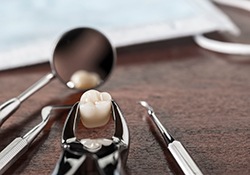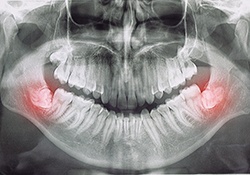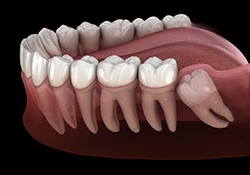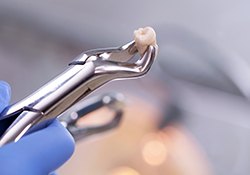Wisdom Tooth Extractions – Downers Grove, IL
Remove Problematic Teeth to Prevent Oral Issues

Are you a teenager or young adult suffering from aches in your jaw that you can’t explain? If so, your wisdom teeth might be growing in. These teeth appear behind your other molars as you transition into adulthood and are infamous for causing issues when they arrive.
Thankfully, our team at Esplanade Dental Care can remove problematic teeth to prevent oral issues and protect your smile. Continue reading to learn more about wisdom tooth extractions, and feel free to contact us for additional information.
Why Choose Esplanade Dental Care for Wisdom Tooth Extractions?
- Member of the American Dental Association
- Insurance Accepted & Flexible Financing Available
- Advanced Technology to Enhance Patient Comfort
What are Wisdom Teeth?

Wisdom teeth are molars that appear years after all your other adult teeth have already grown. They typically arrive in patients who are between 17 and 25 years old, though it’s possible to need to have them taken out later in life, too, if they were left unaddressed.
These last molars are believed to be an evolutionary trait our ancestors developed for survival. They lived on a diet of uncooked, chewy meats, raw seeds, fruits, and vegetables, which could quickly wear down their teeth. The extra set was likely necessary to supplement any damaged or lost teeth in their childhood. Today, we have cooked food, utensils, and top-quality dental care available, so wisdom teeth are considered a vestigial feature that is no longer necessary.
Most people have four wisdom teeth, one for each quadrant of the mouth. However, some folks are born with only one, two, or three, and others are lucky enough not to have any at all!
Why Do Wisdom Teeth Need to Be Removed?

Wisdom teeth are often removed because they can cause one or more issues, such as:
- They often push neighboring teeth out of alignment as they struggle to erupt from your gum line.
- These molars often grow at inappropriate angles, trapping them in the jawbone or gum tissues, resulting in infection.
- They often cause aches and inflammation due to infection or shoving other teeth out of the way.
- Dental hygiene challenges. It’s hard to thoroughly brush and floss partially erupted teeth in the back of your mouth, so they’re likely to develop tooth decay or gum disease, which can be contagious.
What to Expect from the Wisdom Teeth Procedure

The type of procedure needed to preserve your grin depends on the severity of your condition. Those with fully erupted wisdom teeth might undergo a simple extraction. During your appointment, our team will numb the area with a local anesthetic and gently grasp your tooth with forceps to wiggle it free from its socket.
However, wisdom teeth often require a surgical extraction because they easily become trapped in your jawbone or gum tissue. This method involves numbing and/or sedating you so you feel calm and comfortable. Then, we’ll create a small incision to access the tooth. It may need to be broken into smaller pieces to be removed without further damaging your jawbone. Then, we’ll suture the wound closed to prevent potential infection.
Recovering from Wisdom Teeth Extraction

We’ll provide post-op instructions for you to follow to heal as efficiently as possible without developing complications. Your mouth must form a blood clot over the extraction site to protect the vulnerable nerves and bone tissue that are left exposed. Many after-care instructions are aimed at preserving this clot. Some helpful hints include:
- Don’t spit, drink through a straw, or smoke cigarettes because doing so can dislodge your blood clot.
- Use folded gauze or a clean paper towel and press down gently but firmly to slow any bleeding.
- Manage discomfort by taking any prescribed medications exactly as directed, or try over-the-counter options like Tylenol or ibuprofen.
- Avoid eating anything overly hard or crunchy; stick to soft foods for a little while to be safe.
- Take plenty of time to rest and don’t engage in overly strenuous physical activities that elevate your heart rate or blood pressure.
Usually, symptoms subside within a few days, but if your pain continues or worsens, you may have a painful side effect known as dry socket. If that happens, call us immediately so we can ensure that you’re healing as intended.

